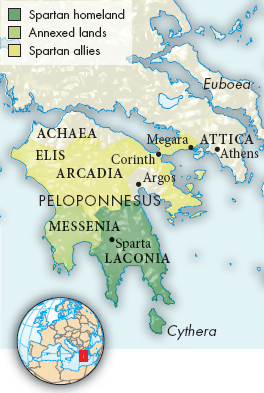The Growth of Sparta
Many different poleis developed during the Archaic period, but Sparta became the leading military power in Greece. To expand their polis, the Spartans did not establish colonies but set out in about 750 B.C.E. to conquer Messenia (muh-

In about 650 B.C.E., Spartan exploitation and oppression of the Messenian helots, along with Sparta’s defeat at the hands of a rival polis, led to a massive helot revolt that became known as the Second Messenian War. After some thirty years of fighting, the Spartans put down the revolt. Nevertheless, the political and social strain it caused led to a transformation of the Spartan polis. After the war, non-
The plan for the new system in Sparta was attributed to the lawgiver Lycurgus, who may or may not have been an actual person. According to later Greek sources, political distinctions among Spartan men were eliminated, and all citizens became legally equal. Governance of the polis was in the hands of two hereditary kings who were primarily military leaders. The kings were also part of the Gerousia (jeh-
To provide for their economic needs, the Spartans divided the land of Messenia among all citizens. Helots worked the land, raised the crops, provided the Spartans with a certain percentage of their harvest, and occasionally served in the army. The Spartans kept the helots in line by means of systematic brutality and oppression.
In the system attributed to Lycurgus, every citizen owed primary allegiance to Sparta. Suppression of the individual together with emphasis on military prowess led to a barracks state. Family life itself was sacrificed to the polis. Once Spartan boys reached the age of seven, they were enrolled in separate companies with other boys their age. They were required to live in the barracks and eat together in a common mess hall until age thirty. They slept outside on reed mats and underwent rugged physical and military training until they were ready to become frontline soldiers. For the rest of their lives, Spartan men kept themselves prepared for combat.
Spartans expected women in citizen families to be good wives and strict mothers of future soldiers. They were prohibited from wearing jewelry or ornate clothes. They, too, were supposed to exercise strenuously in the belief that hard physical training promoted the birth of healthy children. Yet Spartan women were freer than many other Greek women. With men in military service much of their lives, women in citizen families owned land and ran the estates and were not physically restricted or secluded.
Along with the emphasis on military values for both sexes, the Spartan system served to instill in society the civic virtues of dedication to the state and a code of moral conduct. These aspects of Spartan society, along with Spartan military successes, were generally admired throughout the Greek world.